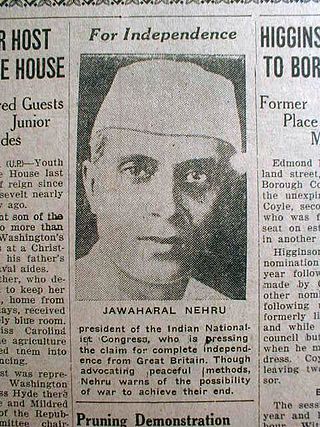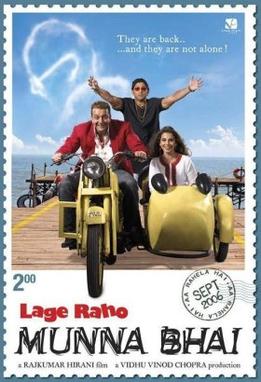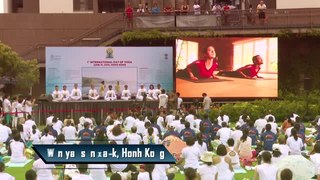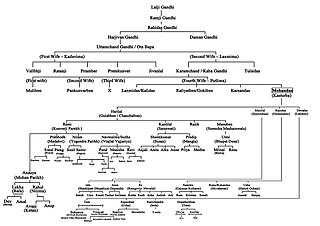
Mohandas Karamchand Gandhi was an Indian lawyer, anti-colonial nationalist and political ethicist who employed nonviolent resistance to lead the successful campaign for India's independence from British rule. He inspired movements for civil rights and freedom across the world. The honorific Mahātmā, first applied to him in South Africa in 1914, is now used throughout the world.

Kasturbai Mohandas Gandhi was an Indian political activist who was involved in the Indian independence movement during British India. She was married to Mohandas Gandhi, commonly known as Mahatma Gandhi. National Safe Motherhood Day is observed in India annually on April 11, coinciding with Kasturba's birthday.

Gandhi Jayanti is an event celebrated in India to mark the birthday of Mahatma Gandhi. It is celebrated annually on 2 October, and is one of the three national holidays in India. The United Nations celebrates the day as International Day of Non-Violence. Called the "Father of The Nation" by Subhas Chandra Bose, Gandhi espoused one of the most well known philosophies of nonviolent resistance.

Independence Day is celebrated annually on 15 August as a public holiday in India commemorating the nation's independence from the United Kingdom on 15 August 1947, the day when the provisions of the Indian Independence Act, which transferred legislative sovereignty to the Indian Constituent Assembly, came into effect. India retained King George VI as head of state until its transition to a republic, when the Constitution of India came into effect on 26 January 1950 and replaced the dominion prefix, Dominion of India, with the enactment of the sovereign law Constitution of India. India attained independence following the independence movement noted for largely non-violent resistance and civil disobedience led by Indian National Congress under the leadership of Mahatma Gandhi who adopted these values from one of the early movements in India led by Ram Singh Kuka.

The International Day of Peace, also officially known as World Peace Day, is a United Nations-sanctioned holiday observed annually on 21 September. It is dedicated to world peace, and specifically the absence of war and violence, such as might be occasioned by a temporary ceasefire in a combat zone for humanitarian aid access. The day was first established in 1981 and first observed in September 1982 and is kept by many nations, political groups, military groups, and people.

Gandhism is a body of ideas that describes the inspiration, vision, and the life work of Mohandas K. Gandhi. It is particularly associated with his contributions to the idea of nonviolent resistance, sometimes also called civil resistance.

In regards to the United Nations, the Campaign for a United Nations Parliamentary Assembly is a "global network of parliamentarians, non governmental organizations, and scholars" that advocates for representatives, not only states, to have "a direct and influential role in global policy."

The Declaration of Purna Swaraj was a resolution which was passed in 1930 because of the dissatisfaction among the Indian masses regarding the British offer of Dominion status to India. The word Purna Swaraj was derived from Sanskrit पूर्ण (Pūrṇa) 'Complete', and स्वराज (Svarāja) 'Self-rule or Sovereignty', or Declaration of the Independence of India, it was promulgated by the Indian National Congress, resolving the Congress and Indian nationalists to fight for Purna Swaraj, or complete self-rule/total independence from the British rule.

The United Nations Postal Administration (UNPA) is the postal agency of the United Nations. It issues postage stamps and postal stationery, denominated in United States dollars for the office in New York, in Swiss francs for the office in Geneva and in euros for the office in Vienna. As such, UNPA is the only postal authority that issues stamps in three different currencies.

Lage Raho Munna Bhai is a 2006 Indian Hindi-language satirical comedy drama film written, edited and directed by Rajkumar Hirani, who also co-wrote the screenplay with Abhijat Joshi, and produced by Vidhu Vinod Chopra under the banner Vinod Chopra Films. A sequel to Munna Bhai M.B.B.S. (2003), the film is the second installment of the Munna Bhai series. Sanjay Dutt and Arshad Warsi reprised their roles as Munna Bhai and Circuit, respectively. New additions to the cast include Vidya Balan, Dilip Prabhavalkar and Dia Mirza, while several actors from the original, notably Jimmy Sheirgill and Boman Irani, appear in new roles.
Seven Social Sins is a list by Frederick Lewis Donaldson that Mohandas Karamchand Gandhi published in his weekly newspaper Young India on October 22, 1925. Later he gave this same list to his grandson, Arun Gandhi, written on a piece of paper on their final day together shortly before his assassination. The Seven Sins are:
- Wealth without work.
- Pleasure without conscience.
- Knowledge without character.
- Commerce without morality.
- Science without humanity.
- Religion without sacrifice.
- Politics without principle.
The UNESCO-Madanjeet Singh Prize for the Promotion of Tolerance and Non-Violence is a prize awarded every two years by UNESCO. It was inaugurated in 1996, following the 1995 United Nations Year for Tolerance and in connection with the 125th anniversary of the birth of Mohandas Gandhi, funded by a donation from Madanjeet Singh.
The Gandhi Foundation is a United Kingdom-based voluntary organisation which seeks to further the work of Mahatma Gandhi through a variety of educational events and activities.

The 10 Rupees Postage stamp depicting Mahatma Gandhi, issued by India in 1948, is one of India's most famous stamps. On 15 August 1948, on the occasion of the first anniversary of India's Independence Day, Gandhi was honored as the first Indian to be depicted on stamps of India. A set of 100 of these stamps was overprinted with the word "Service" and provided only to the Governor General of India for his official use. The 10 Rupees "Service" overprinted stamp is one of India's rarest and most highly valued stamps.
The official languages of the United Nations are the six languages used in United Nations (UN) meetings and in which the UN writes all its official documents.

S. P. Varma is a social worker and peace activist from Jammu and Kashmir. He has been actively involved in peace-building efforts in conflict-ridden areas of the Kashmir valley.

The International Day of Yoga is a day in recognition of Yoga, that is celebrated across the world annually on June 21, following its adoption by the United Nations in 2014. As Yoga exercises have shown immense benefits for physical and mental well-being, it was considered important by the UN to globally promote this wellness practice, which originated in ancient India.

The Gandhi family is the family of Mohandas Karamchand Gandhi, commonly known as Mahatma Gandhi; Mahatma meaning "high souled" or "venerable" in Sanskrit; the particular term 'Mahatma' was accorded Mohandas Gandhi for the first time while he was still in South Africa, and not commonly heard as titular for any other civil figure even of similarly rarefied stature or living or posthumous presence.
Peace, Nonviolence and Empowerment - Gandhian Philosophy in the 21st Century was a conference held in New Delhi January 29–30, 2007. The conference was held to commemorate the centenary of Mohandas Gandhi's satyagraha movement. It was organized by the Indian National Congress. 122 organizations from 90 countries participated in the conference. A number of Nobel Prize laureates attended the event, including Desmond Tutu, Lech Walesa and Professor Mohammed Yunus. Nelson Mandela addressed the meeting via satellite link.











